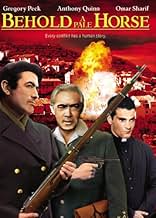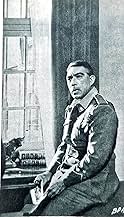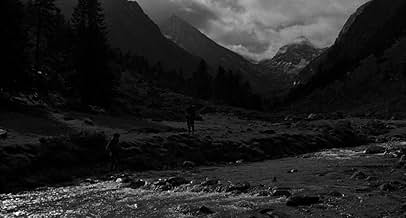AVALIAÇÃO DA IMDb
6,7/10
2,4 mil
SUA AVALIAÇÃO
O famoso bandido espanhol Artiguez retorna à sua aldeia natal espanhola após 20 anos no exílio na França, mas o policial espanhol Vinolas está preparando uma armadilha para ele.O famoso bandido espanhol Artiguez retorna à sua aldeia natal espanhola após 20 anos no exílio na França, mas o policial espanhol Vinolas está preparando uma armadilha para ele.O famoso bandido espanhol Artiguez retorna à sua aldeia natal espanhola após 20 anos no exílio na França, mas o policial espanhol Vinolas está preparando uma armadilha para ele.
- Direção
- Roteiristas
- Artistas
Marietto
- Paco Dages
- (as Marietto Angeletti)
Perrette Pradier
- Maria, Hussy
- (as Perette Pradier)
- Direção
- Roteiristas
- Elenco e equipe completos
- Produção, bilheteria e muito mais no IMDbPro
Avaliações em destaque
Intelligent and magnificent film by the great director Fred Zinnemann . It deals with "Manuel Artíguez" (Gregory Peck), he is a popular "maqui" or partisan who after the Spanish Civil War, left the country such as hundreds of comrades to take refuge in France. Twenty years later, "Paco" , a 11 years kid , and son of his best friend passes the Spanish border to ask him for return to Spain and murder the Captain of the Civil Guard, "Viñolas" (Anthony Quinn), in revenge for the death of his father. Artíguez, a resident in the city of Pau is nowadays retired and ignores the request of the boy . But, "Pilar" (Mildred Dunnock) mother of "Artíguez" falls seriously ill, and "Viñolas" decides to prepare a trap that allows capture "Artíguez" . Although a good priest (Omar Sharif) advises Manuel that he's being double-crossed by Carlos (Raymond Pellegrin), Manuel determines to return at whatever cost.
Picture inspired by the novel "Killing a mouse on Sunday" by Emeric Pressbuguer in which the personages undergo a physical wage war and ideological battle in post-Spanish Civil War . At the beginning displays frames of the documentary "Morir en Madrid," with opening montage by courtesy by Frederic Rossif. The film was shot in Franstudio, Saint-Maurice, Val-de-Marne, France and Lourdes, Hautes-Pyrénées, France . There was built a Spanish street that followed once time was terminated the shooting . Pressburger's novel was loosely based on the last raid of real-life anarchist guerrilla Antonio Sabate who was murdered in an ambush in 1959.
This film is almost unknown since it was banned in Spain for its politics issues until subsequent exhibition in 1979. The movie was prohibited in Spain, which was still commanded by Generalissimo Francisco Franco (deceased in 1975), the victorious General of the Spanish Civil War . And it was scheduled to be telecast on a major American network, but was canceled at the last minute, allegedly at the behest of the Spanish government. Fortunately today we can enjoy this splendid masterpiece , a motion picture masterfully realized and played with a top-notch list of first players . The performers hand perfectly their respective characters . The "Manuel" role in his bitterness and deception is awesome , as well as the "Viñolas" in his toughness and rudeness . Furthermore , a large secondary cast formed by veterans as Mildred Dunnock and Paolo Stoppa ; and brief roles by Daniela Rocca ,Jose Luis Villalonga, Claude Berri , Michael Lonsdale, Christian Marquand and Rosalie Crutchley as the ill wife.
This is an interesting and thought-provoking thriller well produced by Alexander Trauner ( also production designer) and Zinnemann . It packs tension , high intrigue , political events and is slow-moving ; however is pretty entertaining . In spite of the fact that the runtime is overlong, is neither tiring , nor dull , but thrilling . The motion picture is stunningly directed by Fred Zinnemann who had a lot of experience from his former classic films as ¨High Noon, From here to eternity, Man for all seasons ¨, among them. Rating : Very Good , better than average. In spite of being such fine movie the picture had a minor success at the box office . Rating : Above average . Essential and indispensable watching , valiant try by all.
Picture inspired by the novel "Killing a mouse on Sunday" by Emeric Pressbuguer in which the personages undergo a physical wage war and ideological battle in post-Spanish Civil War . At the beginning displays frames of the documentary "Morir en Madrid," with opening montage by courtesy by Frederic Rossif. The film was shot in Franstudio, Saint-Maurice, Val-de-Marne, France and Lourdes, Hautes-Pyrénées, France . There was built a Spanish street that followed once time was terminated the shooting . Pressburger's novel was loosely based on the last raid of real-life anarchist guerrilla Antonio Sabate who was murdered in an ambush in 1959.
This film is almost unknown since it was banned in Spain for its politics issues until subsequent exhibition in 1979. The movie was prohibited in Spain, which was still commanded by Generalissimo Francisco Franco (deceased in 1975), the victorious General of the Spanish Civil War . And it was scheduled to be telecast on a major American network, but was canceled at the last minute, allegedly at the behest of the Spanish government. Fortunately today we can enjoy this splendid masterpiece , a motion picture masterfully realized and played with a top-notch list of first players . The performers hand perfectly their respective characters . The "Manuel" role in his bitterness and deception is awesome , as well as the "Viñolas" in his toughness and rudeness . Furthermore , a large secondary cast formed by veterans as Mildred Dunnock and Paolo Stoppa ; and brief roles by Daniela Rocca ,Jose Luis Villalonga, Claude Berri , Michael Lonsdale, Christian Marquand and Rosalie Crutchley as the ill wife.
This is an interesting and thought-provoking thriller well produced by Alexander Trauner ( also production designer) and Zinnemann . It packs tension , high intrigue , political events and is slow-moving ; however is pretty entertaining . In spite of the fact that the runtime is overlong, is neither tiring , nor dull , but thrilling . The motion picture is stunningly directed by Fred Zinnemann who had a lot of experience from his former classic films as ¨High Noon, From here to eternity, Man for all seasons ¨, among them. Rating : Very Good , better than average. In spite of being such fine movie the picture had a minor success at the box office . Rating : Above average . Essential and indispensable watching , valiant try by all.
This is a film which has almost faded into total obscurity, and that's tragic, because it's well worth seeing. It's sort of a thinking person's suspense movie, better appreciated if you know some details about the intricate historical background in which it is set. Even so, it can be appreciated for its dramatic settings and characterizations. It has a complicated plot, to be sure, but the story rolls right along...not a lot of action until the end, but the tension builds steadily. I'm no fan of Peck, but his role here really drew me in. He looks beaten down by a hard life and way too much unhealthy passion. Quinn doesn't have much screen time, but I liked some of the minor characters best...their faces were great. The credit sequence, meshed together perfectly with newsreels, shows a long line of defeated soldiers, their faces reflecting defeat and confusion... a great tracking scene.
Here are some reasons I think the film is unknown: 1. The main character is an atheist communist anti-catholic guerilla bandit. Not a popular icon in American movies. 2. Complex historical background. 3. Knowledge of political situation in Spain a minimum requirement. Not a priority on many American's lists. 4. Black and white photography in 1964. (Hey, I liked the scenery...but you always wonder how it would look in color...and this was a late date for a black and white feature film.) 5. Civil War movies (even Spain's) always run a risk...you might alienate half the audience.
Here are some reasons I think the film is unknown: 1. The main character is an atheist communist anti-catholic guerilla bandit. Not a popular icon in American movies. 2. Complex historical background. 3. Knowledge of political situation in Spain a minimum requirement. Not a priority on many American's lists. 4. Black and white photography in 1964. (Hey, I liked the scenery...but you always wonder how it would look in color...and this was a late date for a black and white feature film.) 5. Civil War movies (even Spain's) always run a risk...you might alienate half the audience.
I watched this movie, and like most of the people have already expressed it, must say that this is truly a classic. The acting crew is excellent with Peck, Shariff and Quinn giving some very intense performances. But the surprise package is the boy who crosses over to the French part where he goes in search of Manueal to ask him to avenge his father's death at the hands of Vinollas. I often read comments that Peck is stuff or wooden on occasions, but I find him one of the most intense actors because of his ability to convey through his eyes. Like most actors, he is gifted of conveying a lot more through his eyes than his body might suggest. He conveys the frailing Manuel artigez here very well. We know that Manuel is tired and wary of the struggle he has pursued so passionately. Full credit to Peck for portraying that very effectively. Omar Shariff is also brilliant as the confused priest. Quinn is natural and we feel a certain angst against him, I do not know why. The end is excellent which again, conveys the human side of Manuel very well. All in all, an excellent movie worth watching on a calm Sunday afternoon.
When the Spanish War was finished, winners devoted to go after anybody who reflected the red light of the communism or any other color they dislike. On the other hand, few guerilla fighter continued his actions against the winners. But their strength was lower every time. One of this guerrilla was Valentin González "el campesino", which figure is portrayed in this film in a free form (not in an historical form).
Twenty years after the Civil war conclusion, the Spanish police has a good option to capture one of these ex-combatants, who was in exile in France. The description of the methods and day-to-day life of the Spanish police could be the reason which explains that the Spanish Government forbade any more Columbia's film in Spain.
You need no knowledge about the twenty Century Spain's history to understand the film, although you can enjoy more it if you know something. In fact, the film put in a specific political situation the psychological confrontation between two men. It could be a good exercise to understand the motives which impulse his actions.
Twenty years after the Civil war conclusion, the Spanish police has a good option to capture one of these ex-combatants, who was in exile in France. The description of the methods and day-to-day life of the Spanish police could be the reason which explains that the Spanish Government forbade any more Columbia's film in Spain.
You need no knowledge about the twenty Century Spain's history to understand the film, although you can enjoy more it if you know something. In fact, the film put in a specific political situation the psychological confrontation between two men. It could be a good exercise to understand the motives which impulse his actions.
This excellent film tells the story of a stubborn Spanish republican, Manuel Artiguez, who refused to give up the fight when his side lost the Spanish civil war to the fascists in 1938. The film takes place twenty years later, when after many successful raids, Artiguez has lost the will to continue. However, his adversary, a Spanish police chief called Vinolas, has not yet given up on capturing or killing him and sets a trap for him. The trap and the question of whether Artiguez will fall into it it will keep you on your seat for most of the movie. Three men caught between Artiguez and Vinolas, an informer, a priest, and an idealistic Spanish exile boy, add a rich psychological and moral dimension to the film, following themes of idealism, revenge, and the uses of violence.
"Behold" is a great thriller with highly complex characters and a profound moral sensibility. The idealism of Spanish republicans like the boy is on the one hand supported by the oily and hypocritical Vinolas, and on the other hand undercut by the rawness and violence of Artiguez. Neither of the adversaries is vindicated, but neither are they equivalent to one another. The ending will set you thinking for hours, if you're so inclined.
Performances by Peck (Artiguez) and Quinn (Vinolas) are great. Peck is less stuffy than usual. I'm not generally a fan of earnest, wet-eyed Sharif (the priest), but his performance here suits the movie quite well. I can still hear his voice saying "Did the informer escape? Is the bandit safe?"
My only complaint is that for all of its thematic complexity and richness of character the film is at times somewhat melodramatic and the dialogue is sometimes a little clunky. And for some reason its parts, good characters, good plot, good actors, all excellent, do not quite add up into a perfect whole. Nor is it as good as some of the movies it slightly resembles: Guns of Navarone, Battle of Algiers, Wild Bunch. However, it is definitely worthwhile for fans of 'thoughtful thrillers'.
"Behold" is a great thriller with highly complex characters and a profound moral sensibility. The idealism of Spanish republicans like the boy is on the one hand supported by the oily and hypocritical Vinolas, and on the other hand undercut by the rawness and violence of Artiguez. Neither of the adversaries is vindicated, but neither are they equivalent to one another. The ending will set you thinking for hours, if you're so inclined.
Performances by Peck (Artiguez) and Quinn (Vinolas) are great. Peck is less stuffy than usual. I'm not generally a fan of earnest, wet-eyed Sharif (the priest), but his performance here suits the movie quite well. I can still hear his voice saying "Did the informer escape? Is the bandit safe?"
My only complaint is that for all of its thematic complexity and richness of character the film is at times somewhat melodramatic and the dialogue is sometimes a little clunky. And for some reason its parts, good characters, good plot, good actors, all excellent, do not quite add up into a perfect whole. Nor is it as good as some of the movies it slightly resembles: Guns of Navarone, Battle of Algiers, Wild Bunch. However, it is definitely worthwhile for fans of 'thoughtful thrillers'.
Você sabia?
- CuriosidadesThe movie was banned in Spain, which was still ruled by Generalisimo Francisco Franco, the fascist victor of the Spanish Civil War.
- Erros de gravaçãoIn the first 5 minutes of the movie it is supposed to be 1939 and the Loyalist (Republican) soldiers are crossing into exile on the French border. As they cross over they are turning in their guns and the first one to turn in his gun turns in a Soviet PPSh-41 sub-machine gun. The PPSh-41 was not developed until 1941.
- Cenas durante ou pós-créditosOpening credits - the first card shown contains the passage from Revelations 6:8, which contains the phrase "Behold a Pale Horse", the title of the film.
- ConexõesFeatured in Hollywood contra Franco (2008)
Principais escolhas
Faça login para avaliar e ver a lista de recomendações personalizadas
- How long is Behold a Pale Horse?Fornecido pela Alexa
Detalhes
- Data de lançamento
- País de origem
- Idioma
- Também conhecido como
- Behold a Pale Horse
- Locações de filme
- Empresas de produção
- Consulte mais créditos da empresa na IMDbPro
Bilheteria
- Orçamento
- US$ 3.900.000 (estimativa)
- Tempo de duração2 horas 1 minuto
- Cor
- Mixagem de som
- Proporção
- 1.85 : 1
Contribua para esta página
Sugerir uma alteração ou adicionar conteúdo ausente

Principal brecha
By what name was A Voz do Sangue (1964) officially released in India in English?
Responda



































